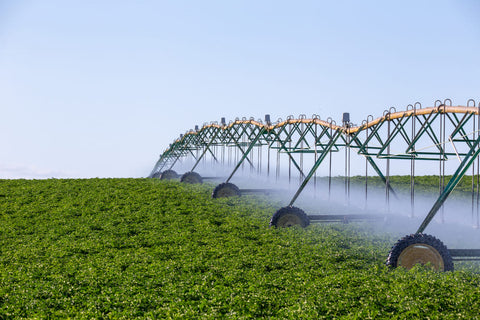Between nationwide droughts and an increased demand for organic produce, the farming industry needs better ways to maximize crop production without sacrificing quality. Thanks to new technological advancements, agricultural equipment like the central pivot irrigation system are helping small-scale and large-scale farmers alike water their crops more efficiently and affordably than ever.
Whether you’re looking for ways to reduce your water usage or simplify how you water crops, a center pivot irrigation pump system will help you improve your watering process. Let’s take a closer look at what center pivot irrigation systems are, how they work, and why phase converters are the most reliable power source for them.
|
Table of Contents |
What Is Center Pivot Irrigation?
Center pivot irrigation is a mechanized irrigation method that uses pressurized water. Center pivot irrigation systems can be used on various terrain types. This makes them ideal for agricultural regions in the Midwest and surrounding areas because farmers aren’t forced to move dirt or do any leveling work just to irrigate their crops.
These systems are particularly popular in Nebraska, which is the largest irrigator in the country, ranking third out of states with the most agricultural revenue. Roughly 55,000 center pivot irrigation systems can be found across 6.7 million acres of farmland statewide.

How Does Center Pivot Irrigation Work?
Most center pivot irrigation systems run on electricity provided by a utility company or a generator. Some systems are powered by a hydraulic engine. The entire system pivots around a center point and distributes water in a circular pattern. These systems are used to water crops as well as apply fertilizer, chemicals, and herbicides to them.
Center pivot irrigation systems feature a stainless steel pipeline connected to mobile trusses that are directly underneath. Each truss has its own motorized wheels that allow for circular movement. Groundwater from a well sprays from sprinkler nozzles that either run across the top of the pipeline or suspend from a cable connected to the bottom of the pipeline. If the water pressure is too low or too high, you can adjust the flow rate accordingly.

The Pros & Cons of Center Pivot Irrigation
Pros
- Economical for Larger Operations: Center pivot irrigation systems require minimal labor after setup and last 20 years, on average, with routine maintenance. This makes them an ideal choice for larger farming operations.
- Highly Water Efficient: Center pivot irrigation systems have a maximum water efficiency rate of 85% to 95%, making them more efficient than sprinkler irrigation and flood irrigation systems.
- Useful for Pesticide and Fertilizer Applications: Center pivot irrigation systems can also be used for chemigation or fertigation processes, enabling farmers to apply fertilizers and pesticides faster and cheaper than ever.
Cons
- Initial Outlay is Expensive: Center pivot irrigation systems are an investment, with a standard 160-acre system costing up to $80,000. This price includes fuel, electrical, and water costs.
- Inefficient for Square or Rectangular Fields: Since center pivot irrigation systems only follow a circular path, they can’t reach the corners of fields.
- May Encourage Plant Disease: Frequent watering can create an environment for bacteria and fungal diseases to thrive due to excess moisture. This is especially common near the base of the pivot structure.

Powering Center Pivot Irrigation Systems
Center pivot irrigation systems need a stable and consistent power supply to operate efficiently. While single-phase power is sufficient for household appliances, farming equipment requires three-phase power.
The problem is that rural areas where farmland is located have little to no access to three-phase power. Even if an area has access, paying a local power company to supply your property with three-phase power is expensive.
Why Phase Converters Are the Answer
Farmers prefer to get their three-phase power from a phase converter rather than a utility provider because it’s cheaper and just as effective. Phase converters can be installed on-site to transform single-phase power into three-phase power, which is much more reliable for agricultural equipment and applications. Invest in a quality phase converter now to save time and money every time you operate your center pivot irrigation system.
The Leading Provider of Durable Phase Converters
Center pivot and other farming irrigation systems need the right kind of power to operate at full capacity. If you don’t have access to utility three-phase power or can’t afford it, opt for a phase converter instead. These machines deliver a steady stream of three-phase power more efficiently and for a fraction of the cost.
When you need a rotary phase converter you can count on, Phoenix Phase Converters has a solution. Our digital and non-digital phase converters are made with durable materials, like cast iron sealed vents that keep out unwanted debris, and are compatible with various load types. Plus, you can customize them to meet your unique power requirements.
Contact a voltage balance specialist today to find the right phase converter for your center pivot irrigation system. All orders ship free.
